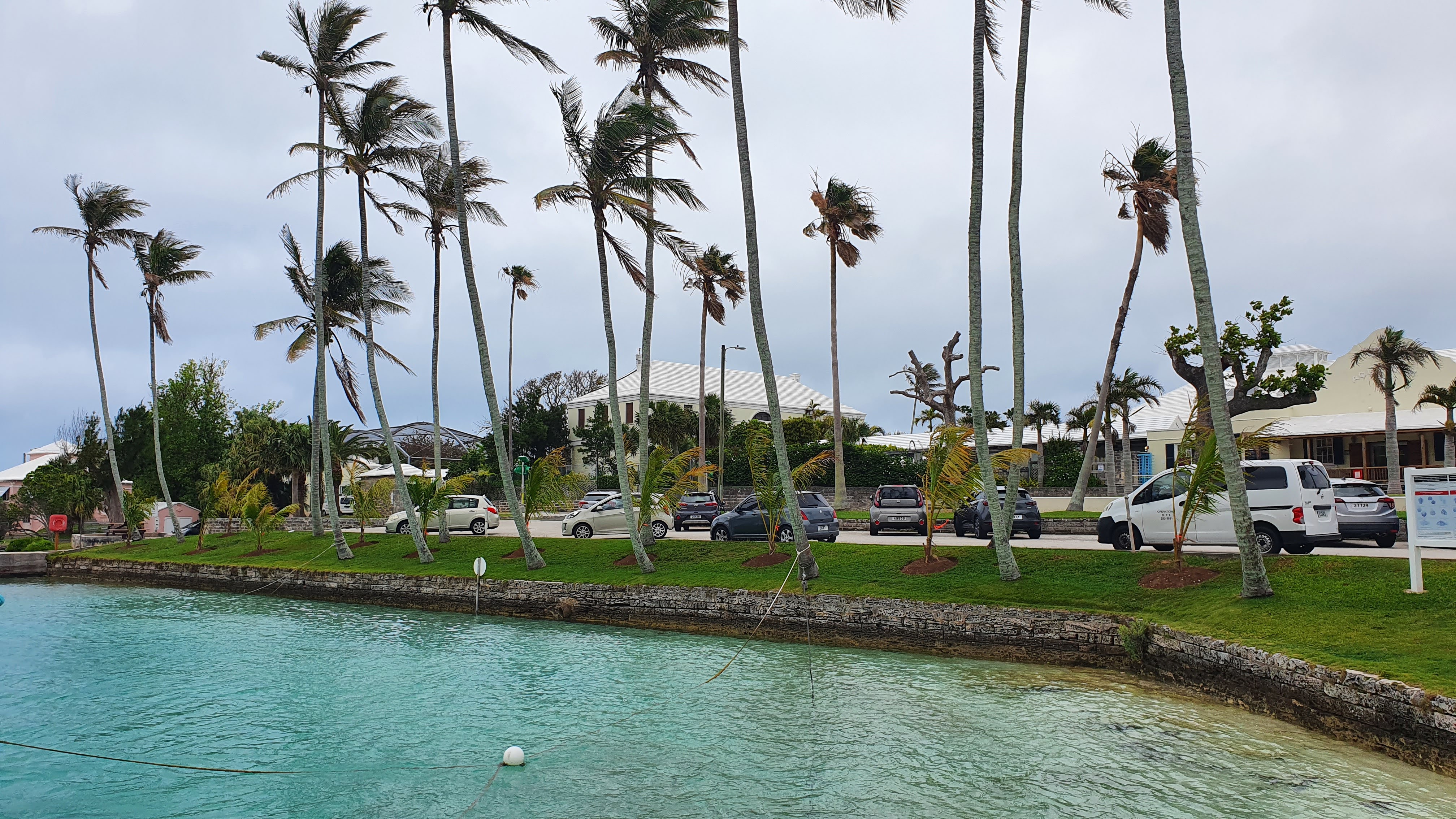All the latest news and updates from the Bermuda Aquarium, Museum & Zoo, one of Bermuda's leading visitor attractions!
Latest News
Aming stars as Shark Week hits screens
Jessie Moniz Hardy
Published Aug 9, 2017 at 8:00 am (Updated Aug 8, 2017 at 7:01 pm)
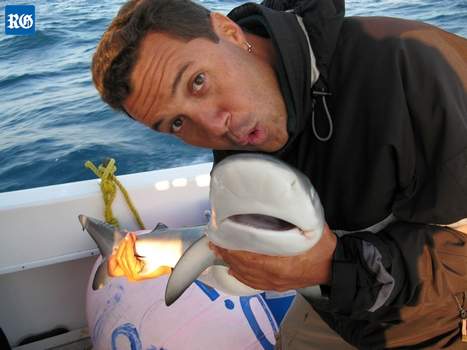
(New best friend: Choy Aming, who has featured on
Canada’s Discovery Channel during Shark Week, pose)
Choy Aming’s phone started ringing the moment Shark Week hit Canadian television last month.
Friends and family living in Canada had spotted something familiar on the popular series of shark related programming — him. On July 24, the 42-year-old shark researcher appeared on Canada’s Discovery Channel show the Daily Planet Dives into Shark Week.
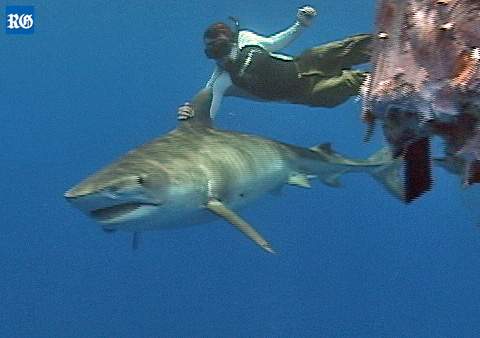
Choy Aming swimming with sharks (Photograph supplied)
“Shark Week is seen by two million viewers,” said Mr Aming, the co-founder of the Bermuda Shark Project. “Whenever you get on something like that it is pretty exciting. It is fun to be on TV anyway, but it is also encouraging to have my research highlighted.”
The show included footage of Mr Aming standing on a whale carcass bobbing in the ocean, while sharks fed off the meat beneath his feet.
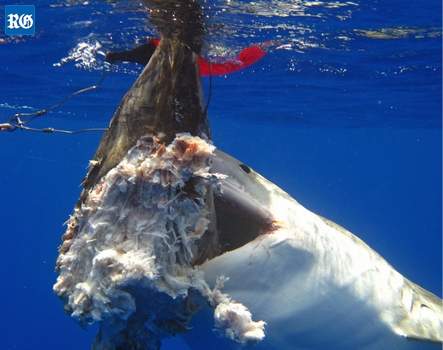
Caption - A tiger shark feeding (Photograph supplied)
“People who saw it told me it was really cool to see Bermuda, and fun and exciting to see someone they knew,” he said. “It turned out well and Bermuda looked good.”
Canadian television producer Christine Mayall spotted Mr Aming while in Bermuda filming the America’s Cup.
“She was looking around for other stories to film,” said Mr Aming. “She found me online.”
He took Ms Mayall and a cameraman out to film sharks, but couldn’t find any.
“It was May, and a bit too early for sharks,” said Mr Aming. “July, August and September is more the season. I did warn them that we might not find any.”
In the end, Mr Aming supplied his own footage. He was impressed that Ms Mayall seemed interested in the scientific side of things.
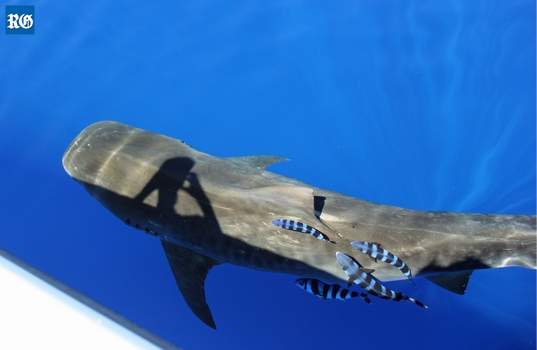
A tiger shark (Photograph supplied)
“It is always nice to get on a show with a network that seems to do good work,” said Mr Aming. “The Discovery Channel in Canada has a great following. Canadians are typically environmental at heart.”
In previous years he had less success approaching Discovery Channel producers in America.
“I did meet with them,” said Mr Aming. “But they seemed only interested in great white sharks. I found it odd because there are 400 other species of sharks.”
His research focuses primarily on tiger sharks visiting Bermuda in the summer months.
He has found them to be creatures of habit, often arriving and leaving at the exact same time every year.
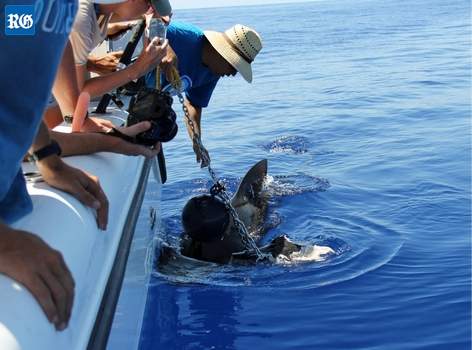
Up close and personal: a tiger shark feeding and, below, Choy Aming
swims with the sharks (Photographs supplied)
“I guess humans aren’t the only ones who like to vacation in Bermuda,” Mr Aming joked.
When he first started the Bermuda Shark Project with the late Neil Burnie in 2005, the pair made a shark cage to protect themselves from the toothy predators.
Twelve years later the cage is long gone.
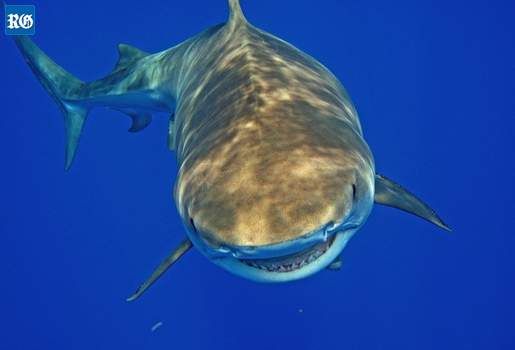
A tiger shark (Photograph supplied)
“It was big and cumbersome and once we started free swimming with the sharks we realised we could do it in relative safety,” Mr Aming said.
Part of the research involves placing satellite tags on the sharks.
“You do have to be careful when you are handling them,” Mr Aming said. “When we have to strap them to side of the boat to tag, they are not wanting to be restricted, so they thrash. That is not too bad, as we are up on the boat when we do it. I have been bumped by them in the water a few times.
“The first time is a little bit nerve-racking.”
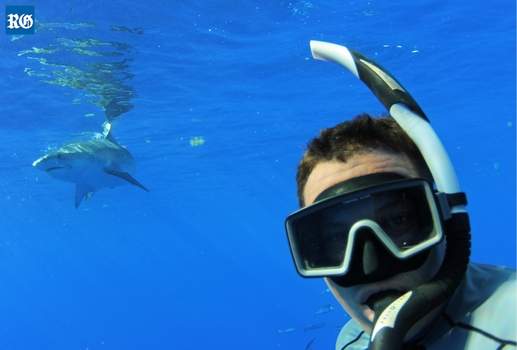
Choy Aming swimming with sharks (Photograph supplied)
But Shark Week is not Mr Aming’s first time in the spotlight. He and Dr Burnie produced a show called Ocean Vet which is available on Vimeo on Demand, and has been sold to networks in Finland, France, Thailand and other countries.
Now he and other local scientists are working on another project, Ocean Tech. Ocean Tech takes shark tagging a step further, by following and filming them using underwater drones.
Mr Aming hopes to use footage from the drones to make a documentary.
“We are at the fundraising stage right now,” he said. “We should have it up and running next summer.”
•See: www.youtube.com/watch?v=V0ClkwrboH4&;feature=youtu.be. For more information about the Bermuda Shark Project see atlanticwildlifeconservation.com/conservation-research/bermuda-shark-project.
